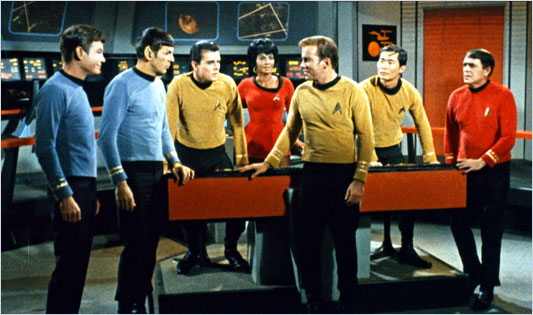10 Things Writers Can Learn from Star Trek
I’ve had the pleasure of watching Star Trek (The Original Series) for the first time in my life. Even though it originally aired while I was alive, I was too young to “get it.” I am currently on the third season and have learned many lessons from the creator, Gene Roddenberry, that I can apply as a writer.
1. Your fans have to love all of your characters, even if they don’t like each other. I love Kirk. I love Spock. I love Uhura. I love Sulu. I love Scotty. I love McCoy. I love when McCoy and Spock clash. I love each character in a different way, which means that Roddenberry and the writers created a full cast of three-dimensional characters that were sympathetic and identifiable. Lesson: don’t just flesh out your main characters, create a great ensemble.
 2. Your hero has to risk everything in each story, and then save the day. Kirk rocks. ‘Nuff said.
2. Your hero has to risk everything in each story, and then save the day. Kirk rocks. ‘Nuff said.
3. Intelligent dialog is just as exciting as action. Roddenberry said he didn’t want to write an “action” series, but one that incorporated intelligent thought and dialog. Although the network forced some fight scenes into the action, the creator remained true to his vision. Spock’s deductions and Kirk’s philosophical speeches are just as fascinating as a good fight scene.
4. All characters speak English, no matter where they live. It’s amazing (and hysterical) that in Roddenberry’s world, every creature in the galaxy speaks English. But also mighty convenient. If you have characters in your novel that speak a different language, translate it. Unless it’s a phrase that most English-speakers would know, like “Adios, amigo!” which does not need translation. You can also translate by having another character reply: “¿A dónde va?” “He went that way!”
5. If a place looks familiar, watch out! A surprise is in store. Everyone knows that if Kirk and the gang walk into an old Western town, something is awry. Don’t use location clichés. Create a setting that may look familiar but has an unexpected twist for your readers.
6. Every character has a job to do. Each character has a role: communications, engineering, steering, medical, data processing. They stick to those roles so the fans can tell them apart. They are experts in their fields, and don’t switch jobs unless it’s an emergency. Give your characters an expertise and a defined role in the story.
 7. Be an Equal Opportunity Employer. It may not be noticeable in this day and age, but it was a ground-breaking move to cast Nichelle Nichols as the Communications Director of the Enterprise. Roddenberry cast a black woman in a role equal to all the white men on board. Even Dr. Martin Luther King (a fan of the series) talked Nichols into staying on the show, telling her she was a role model for women and blacks around the world. You, too, should think of “casting” your novel with characters who are different from you. If you’re a female, your protagonist can be male. And make sure there’s some color in your world. James Patterson was one of the first white authors to write a black protagonist in his Alex Cross series.
7. Be an Equal Opportunity Employer. It may not be noticeable in this day and age, but it was a ground-breaking move to cast Nichelle Nichols as the Communications Director of the Enterprise. Roddenberry cast a black woman in a role equal to all the white men on board. Even Dr. Martin Luther King (a fan of the series) talked Nichols into staying on the show, telling her she was a role model for women and blacks around the world. You, too, should think of “casting” your novel with characters who are different from you. If you’re a female, your protagonist can be male. And make sure there’s some color in your world. James Patterson was one of the first white authors to write a black protagonist in his Alex Cross series.
8. Your setting can be a beloved character. The Enterprise. Tara. Titanic. The bar in Cheers. These are all examples of iconic settings. When the place becomes just as important–and as beloved to fans–as the characters, it becomes a character. Your story will be more memorable when you create a setting that is as unique and interesting as your characters.
9. Everything must be logical. Even in a different world in a galaxy far, far away, situations must remain logical for your readers. If people fly, and see in purple, and think in Klingon, and only feel pain, and age backwards, it’s too much for your readers to comprehend. Keep your world logical. But if you have to break the rules of quantum physics, make sure you explain why. And how.
 10. Don’t smell the flowers and don’t wear a red shirt! Unless you’re Scotty, who is somehow immune to the Red Shirt Syndrome, putting on a red shirt will most definitely cost you your life. And don’t smell any flower on any other planet; they are lethal. I just had to throw those in, but there is a lesson here, too. Be careful of creating your own clichés.
10. Don’t smell the flowers and don’t wear a red shirt! Unless you’re Scotty, who is somehow immune to the Red Shirt Syndrome, putting on a red shirt will most definitely cost you your life. And don’t smell any flower on any other planet; they are lethal. I just had to throw those in, but there is a lesson here, too. Be careful of creating your own clichés.
